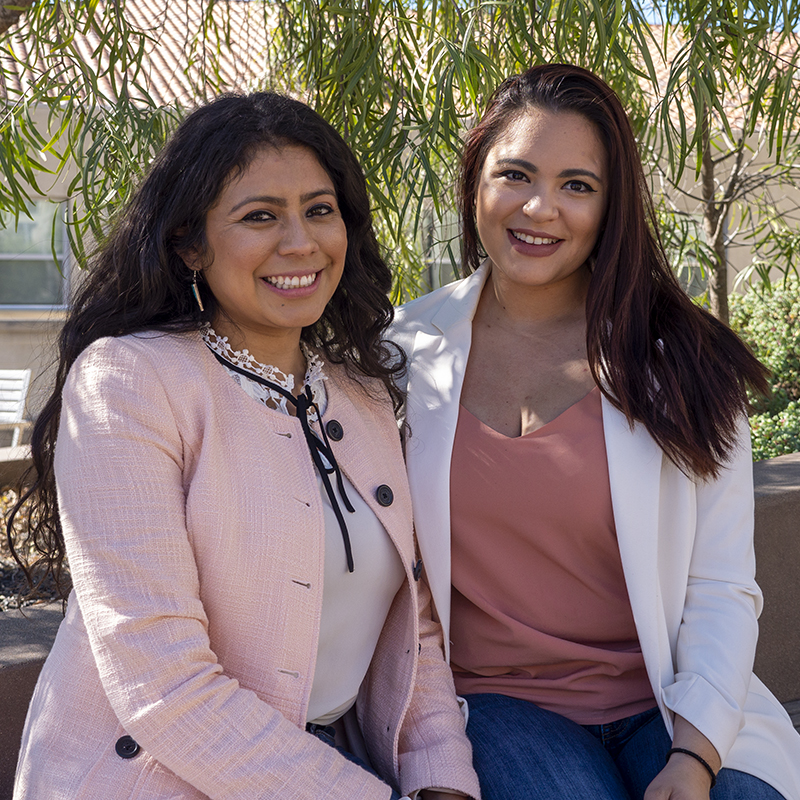 “Be Brown, Be Proud, and Bring That to Law School”
“Be Brown, Be Proud, and Bring That to Law School”
La Raza Co-Chairs Bring National Latinx Law Students Association Conference to the West Coast
Q: Why did you decide to attend Berkeley Law?
Katy: I grew up in a Puerto Rican household in New Jersey with both of my grandparents from either side living in the two family home. When looking for law schools, it was really important to find a Latinx community, because that’s something that I lacked in my undergrad. One of the things that stuck out to me about Berkeley was the La Raza Law Journal, which is one of the only journals focused on Latinx issues and scholars in the T14 (top 14 ranked law schools). Then when I came to Admitted Students Weekend, La Raza students were so welcoming. The co-chair was a Latina from Queens, and she told me about the academic and professional development, the programming, and just the great community of people. It really sealed the deal for me.
Estefani: I’m a first generation college student and the fourth of seven children. I come from an immigrant community of mixed immigration status . And so the drive for me to go to law school was to become an advocate for my community. Latinx people make up only 4 percent of the legal profession, so it’s true what they say, it takes a village to be successful. La Raza is that village. From the very beginning I felt supported by the La Raza community, from current students to the alumni network who are willing to go to bat for us.
Q: Why did you want to bring the National Latinx Law Students Association Conference to Berkeley Law?
Estefani: The La Raza alumni community is really what makes Berkeley Law a great fit to host the conference. When we announced Berkeley had been chosen to host, they were so eager to help. They were emailing us, “We want to get involved. Let us know what you need.” Almost half of the panelists are Berkeley Law alums.
Katy: La Raza at Berkeley Law is 50 years strong. The fact that we had Latinx leadership back in 1969 is amazing. They paved the way for us, so we wanted to emphasize the theme that we are the past, present, and future of our people through the conference programming. I think having this national conference that showcases Latinx law students and Latinx lawyers really sends a message of the strength of our growing presence in the legal profession.
Q: Did you plan all of the panels? What type of content did you think would be valuable?
Katy: Between the two of us we planned the whole curriculum and lined up speakers for 16 panels.
Estefani: With the past, present, and future theme in mind, we’re highlighting Central Valley Farm Workers and 50 years of Centro Legal de La Raza, which was started by Berkeley Law students. We also have someone coming from the Dolores Huerta Foundation to talk about the labor rights movement in California. In terms of the present, what’s affecting the Latinx community is immigration work and border issues. We’re also doing sessions on accessibility and highlighting Latinx attorneys in different sectors, like public defenders, prosecutors, legislative and policy making, in-house, and private practice.
Katy: And then speaking to the future, there’s going to be a pre-law panel and opportunities for pre-law students to get one-on-one sessions with current students, a career fair, and a pre-law fair. So all of those different moving parts will highlight Latinx excellence and issues in the Latinx community, but also provide prospective law students with access that they might not otherwise have.
Q: What do you hope attendees will take away from the conference?
Katy: Just the experience of being Latinx in the legal profession. So many of the alumni and panelists I spoke to during the organizing process were like, “I’m the only Latinx person in my office,” or “I’m the only Latinx partner in my firm.” And so I think a big part of the conversations will be learning from their experience and how to navigate a profession that didn’t contemplate you being a part of it originally.
Estefani: In terms of current and prospective law students, be brown, be proud, and bring that to law school. I think a lot of Latinx students, especially first gen students, deal with imposter syndrome. But you shouldn’t feel because you’re coming to law school that you have to lose your identity. I think this conference will help Latinx people feel like they belong here and that their voices are valuable.
Katy: I also hope it will build morale for the older generation of Latinx lawyers. Their experience was to put their heads down and not mention they’re Latinx. They didn’t want people to know they grew up speaking Spanish because they might question whether they belong. Now, not only have Latinx numbers in law school grown, but there’s also a spirit of, “We’re here, we’re proud of our culture, and we want to contribute that to the workplace.” Having that diversity and perspective is important. We want them to see that their experience laid the groundwork for us, that we stand on their shoulders. So I think it’s going to be beneficial for all generations.